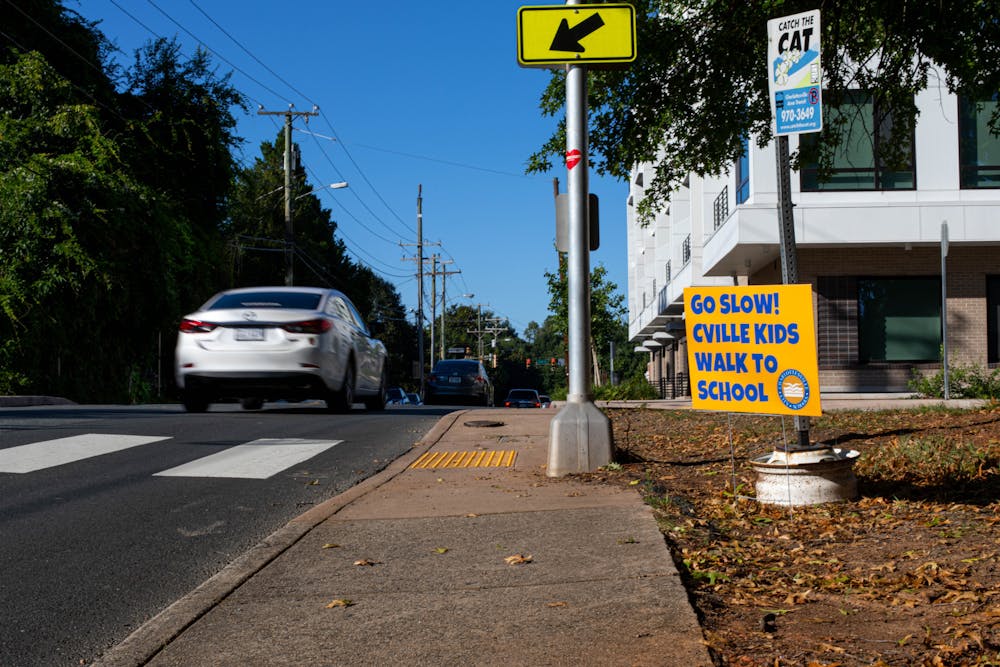Both Charlottesville City Schools and Albemarle County Public Schools continue to face a drastic shortage of bus drivers — between the two systems, more than 3,000 students have been left without a bus to school. Both counties are adjusting responses developed last fall to maximize the numbers of students with safe transportation options.
Currently both CCS and ACPS have expanded ‘walk zones’ — areas close enough to the school that students in those areas are no longer eligible for bus transit. Administrators began expanding these zones last year in response to similar driver shortages.
Crossing guards are stationed at several key intersections to improve safety for the increased number of walkers. Families of elementary school students also have the option to sign their children up for “walking school buses” staffed by teachers and community volunteers that take students from a central location to Venable and Clark elementary schools.
Phil Giaramita, public affairs and strategic communications officer for ACPS, said that this year’s expansion of walking zones brought between 200 to 300 kids off the buses. This year, the county is also implementing a bus waitlist but hopes to bring as many students off the waitlist as possible as more drivers are trained and hired.
The county will have a better understanding of how many students are actually using the bus by mid-September and can then reconfigure the routes to bring more students off of the waitlist, according to Giaramita.
“The good news is that we think there's some opportunities out there to make even further progress [to get students off of the waitlist], and then suspension of service is something that we might be able to eliminate without too many more months to go,” Giaramita said.
Albemarle County raised the school bus driver pay to $21.50 per hour in an effort to fill more bus driver positions, but the county is still facing a shortage of 12 drivers — leaving 12 routes without bus transportation.
Giaramita said the county currently has a number of driver trainees who are in the process of earning their commercial drivers license. Most CDL training programs require 40 hours of classroom instruction and 80 hours behind the wheel.
Giaramita noted, however, that the December 2022 pay raise and introduction of a step-scale for drivers has not brought in many new recruits. Instead, he said that most new interest comes from people interested in helping the schools during this shortage.
“The real answer to the problem is to recruit more drivers,” Giaramita siad. “You need to be pretty close to being fully staffed and in our case, that means adding 12 drivers and being able to maintain that level over the course of the year.”
Last year, many ACPS bus drivers served “double back” bus routes, where they drove one group of students to school and then came back to transport another group — leading to arrival delays of up to an hour.
“We opened a school year expecting that 1,000 students will be on a waitlist [for a bus],” Giaramita said. “The other side of that is we didn't have to cancel school and we would no longer have kids arriving an hour or two hours later every day.”
CCS is also continuing to improve upon past initiatives to help families get their kids to school this year. Last year, CCS began utilizing a need-based method for offering students bus seats based on a registration form filled out by parents and will continue the program this year.
According to Amanda Korman, community relations liaison for CCS, this process allows the school system to prioritize high-need students — students who have special needs or who would not be able to get to school without a bus. The process also creates flexibility to offer seats to more students as the school gains more clarity on who is actually using the bus.
“There are some families that we know to be high need, but we didn't hear from them in our annual re-registration process — but just because we didn't hear from them, we didn't want to not reserve a seat for them because our schools maintain very close relationships with their families,” Korman said.
Korman also noted that many families do not need bus services for all of their children, especially because it is common for a family to live in the walk zone for their elementary school but live far away from their children’s high school.
Older CCS students who do not currently have access to a bus route have the option of using CAT transportation to travel to Walker, Buford and Charlottesville High School.
To help students choosing to walk, University volunteer group Madison House partnered with the leaders of the school system’s walking buses last spring.
Third year College student Georgia Beatty has led the walking bus to Venable Elementary since February 2023.
“The teachers really stepped up and made it so that kids can get to school and the number of kids has just increased so much,” Beatty said. “They need more eyes to watch all of them at the same time.”
Despite creative solutions, the shortage of bus drivers continues to be a major national problem. In the meantime, Giaramita said the gaps in driving staff make the task of providing full service to the network of 7,000 Albemarle students an ultimately impossible task.
“It really does come down to being fully staffed and if you're not there, you've got a couple of very unappetizing options that you've got to deal with,” Giaramita said. “And no matter which, something was going to be inconvenienced.”







